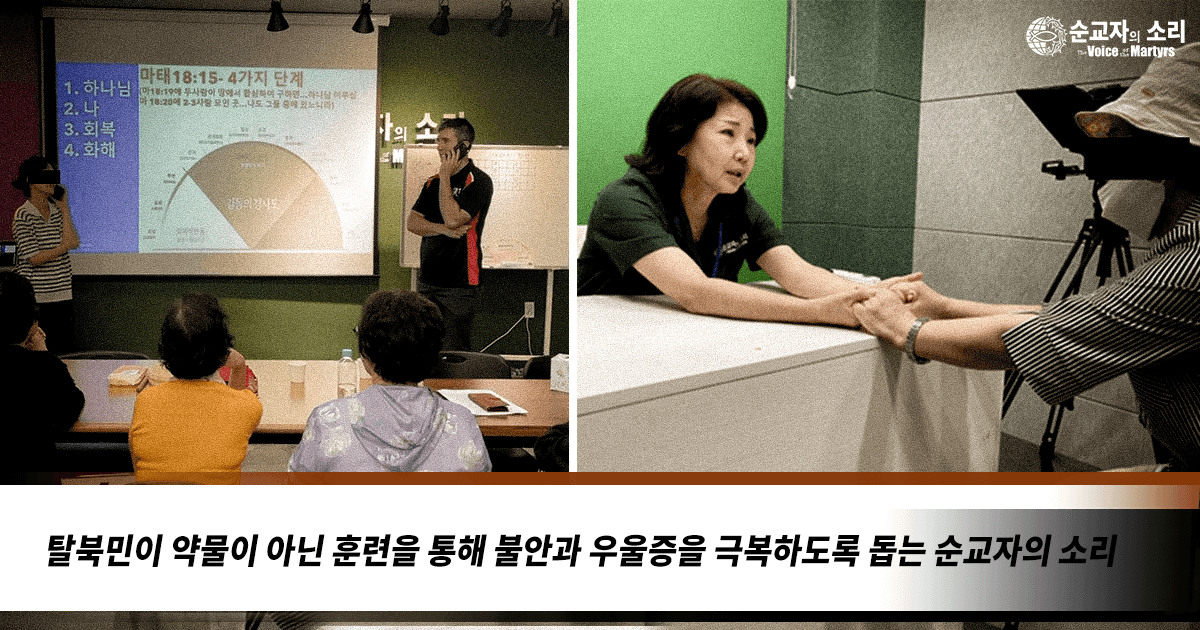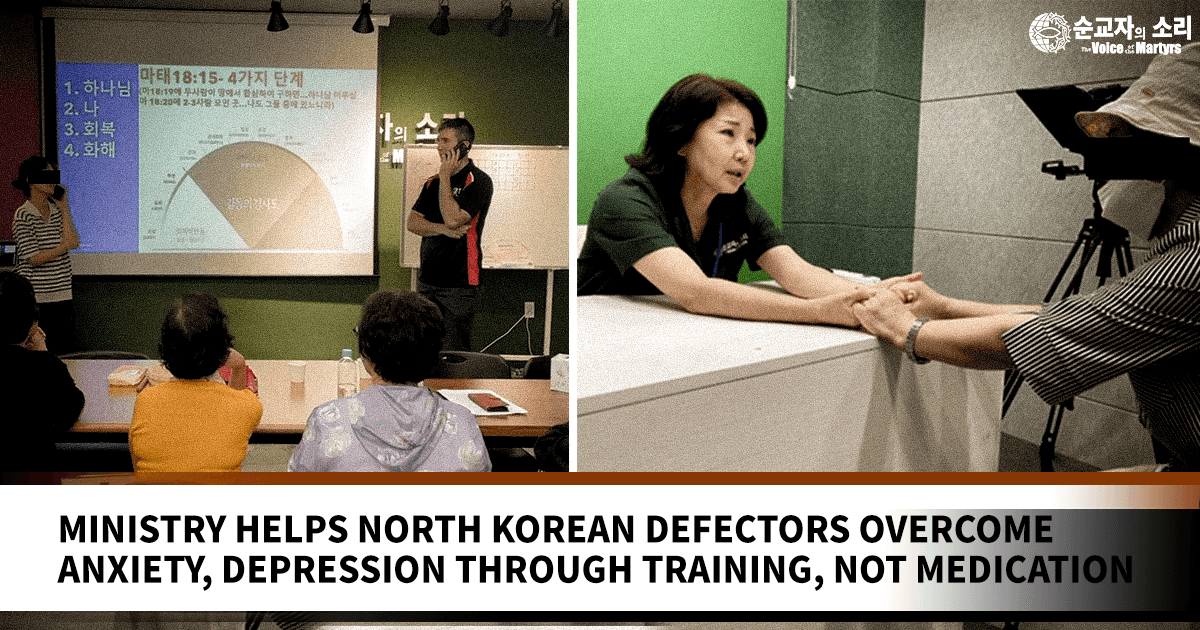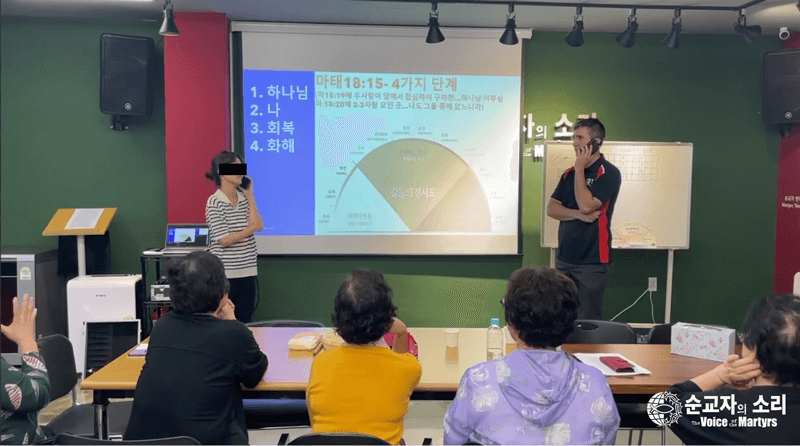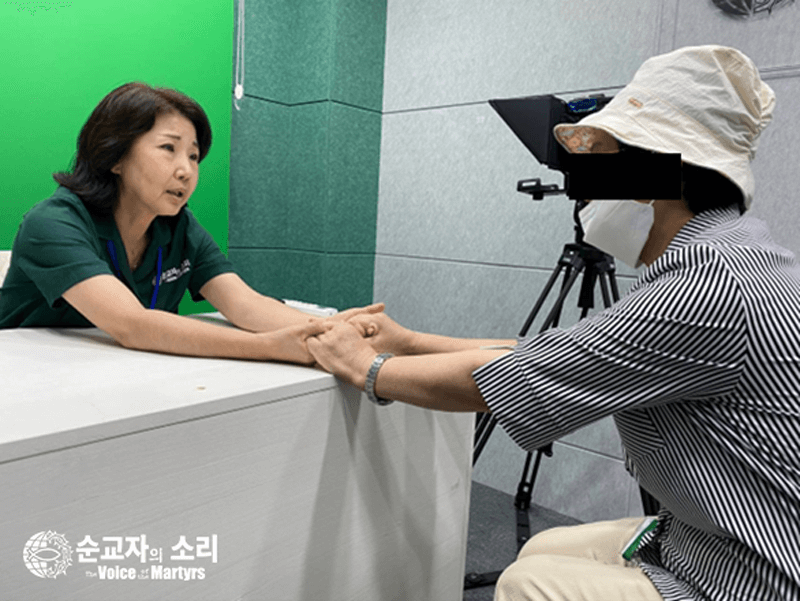
MINISTRY HELPS NORTH KOREAN DEFECTORS OVERCOME ANXIETY, DEPRESSION THROUGH TRAINING, NOT MEDICATION

Conflict resolution training, not medication, is the preferable treatment for North Korean defectors suffering from anxiety, depression, trauma, and insomnia. So says Dr. Hyun Sook Foley, Representative of Voice of the Martyrs Korea. Her organization operates two ministry training schools for North Korean defectors in South Korea, and Dr. Foley says she regularly meets North Korean defectors who are taking prescription anti-depressants and sleeping pills as their main means of coping with conflict. She says she frequently draws on her training as a Christian counselor and a certified conflict coach to teach North Koren defectors biblical strategies for facing and resolving their problems rather than relying on medication.
Representative Foley says that often it is Christian North Korean defectors who face the most difficulties.
“In church, North Korean defectors often see a wrong model where to be Christian means to avoid or suppress conflict, rather than facing it and resolving it,” says Representative Foley. “So they learn that they need to stuff their conflicts down deep inside themselves and keep a smile on their face and only pleasant words on their lips.”
Dr. Foley recalls a North Korean defector pastor who told her that when he was in seminary he learned by watching South Korean students how to tell white lies to stay out of conflict with people, rather than striving for authentic relationships. “Rather than learning how to resolve conflict, he learned how to hide it by only giving people compliments and saying pleasant things,” says Representative Foley.
The end result, she says, is that North Korean defectors wrongly conclude that being Christian means not having conflict rather than having the resources to resolve it. “The anxiety, depression, trauma, and insomnia become to them signs that they lack faith and that something is wrong with them,” says Representative Foley. “They are afraid of admitting to church leaders that they are struggling with conflict. So they turn to doctors for a cure, and often they end up being placed on heavy medications, which only make the problems easier to hide. But no amount of medications can resolve a conflict. Even with medication the problems don’t go away, the sleeplessness continues, and North Korean defectors end up isolated and unable to sustain lasting relationships or to build new ones.”

Voice of the Martyrs Korea team members teach biblical conflict resolution to North Korean defector students.
Dr. Foley says she has seen North Korean defectors end friendships of fifty years based on simple misunderstandings.
“When they experience a conflict, they will leave a church or break a relationship by smiling and saying, ‘Oh, I just have health problems and need to rest.’ But what they really mean is, ‘I got hurt and I don’t know how to fix the problem, so I am ending this relationship and retreating to safety’,” says Dr. Foley. “We need to stop telling people that Christ takes away our conflicts and start teaching them that Christ makes it possible for us to resolve even our worst conflicts. We need to learn and put into practice the more than 1,000 verses of scripture in the Old and New Testament where God gives us specific direction about how he wants us to deal with our interpersonal difficulties.”
It is those scriptures, along with simple strategies for implementing them in everyday life, that Dr. Foley and her team teach to the North Korean defectors who attend Voice of the Martyrs Korea’s two discipleship training schools. The result, says Dr. Foley, is that students end up being less dependent on medication and more confident that the conflicts they experience are opportunities to glorify God, not a sign that there is something wrong with them or their faith.
Representative Foley says that the two North Korean defector students whose fifty-year relationship had been broken by a simple misunderstanding were quickly able to resolve their conflict once they were given tools and coaching to talk openly and constructively about their problem. She says that once students learn biblical techniques for resolving conflict, they become more willing to reach out to other North Korean defectors who they previously thought were incapable of relationship.
“There were two North Korean defectors we know who were living in the same apartment complex, but they had never talked to each other,” says Representative Foley. “We asked one of them why she had not reached out to the other. She said, ‘Oh, she has Alzheimer’s, so it’s not possible to have a relationship with her.’ But in fact, we ourselves already did have a good relationship with the other defector! She had been hastily diagnosed by a doctor with Alzheimer’s when she told him that she had a hard time remembering things these days and was experiencing insomnia and anxiety. But in fact, she is quite normal and is actually a delightful person who was experiencing very normal responses to stress. The medication and the Alzheimer’s diagnosis she had received were isolating her from normal life and relationships. What she needed was help dealing with her conflicts, not medicine to help her accept her symptoms.”

Voice of the Martyrs Korea Representative Dr. Hyun Sook Foley with a North Korean defector.
Representative Foley says that her North Korean defector students benefit from role playing scenarios of conflict and taking time to discuss and evaluate possible ways that the conflict might be resolved. “Often we share with them conflicts from our own lives so that they can understand that it is normal for Christians to have conflicts,” says Representative Foley.
She says that even though South Korean Christians also often don’t know how to resolve their conflicts, the situation is made worse for North Korean defectors because of their cultural background and their present circumstances.
“From a very young age, North Koreans learn to participate in government-mandated ‘self-criticism’ sessions. In reality, these are sessions where they must criticize everyone else and defend themselves in order to survive,” says Representative Foley. “So even now that they are in South Korea, when a conflict begins to emerge in their life, they often attack the other person first, very strongly and very quickly, due to their North Korean survival instinct. And then, because they often don’t have many family members in South Korea, they retreat to their apartments and hide, experiencing sleepless nights and remaining all alone. When South Koreans get into conflicts, another friend or family member will come around and help make a path forward. But for North Korean defectors, once they retreat to their apartments, they can become isolated for years. Their symptoms get worse, so their only ongoing relationship is with the doctor, who is simply prescribing more and more medication.”
Representative Foley says that while medication is sometimes helpful for North Korean defectors, it should never be prescribed without a plan to also help the North Korean defector address underlying behavioral factors. “A big part of our North Korean defector ministry is about going out to find these individual ‘lost sheep’ that have been hiding out in their own apartments for two, three, or four years. Many are convinced that there is something deeply wrong with them because of their symptoms. We try to help them understand that anxiety, depression, trauma, and insomnia are actually very normal responses to the kinds of difficulties they are facing. And then we tell them that medicine, alcohol, and isolation can’t make those problems go away. We listen to their stories and hear about relationships they have broken and that they miss so much but are convinced are gone forever. They are convinced their medication is the only thing they can depend on. We tell them that Christ can raise dead relationships back to life! But they need more than preaching. They need practice and coaching to help them restore those relationships, and that is what we provide.”
Individuals interested in learning more about Voice of the Martyrs Korea’s North Korean ministry can visit https://vomkorea.com/en/northkorea/ or contact the ministry at 02-2065-0703 for more information.

